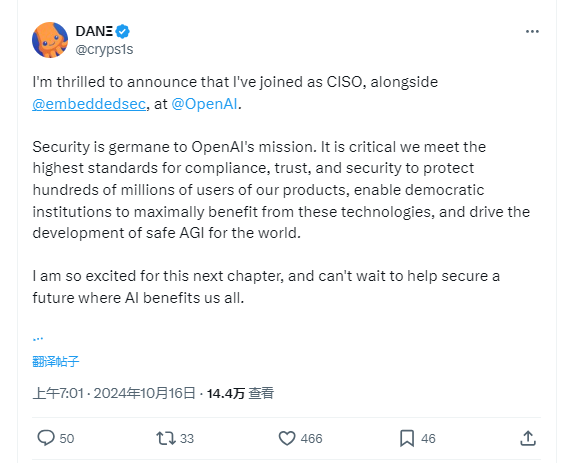After OpenAI recently experienced personnel changes, it has actively introduced talents to enhance the company's strength. Recently, former Palantir chief information security officer Dane Stuckey officially joined OpenAI as chief information security officer (CISO). The editor of Downcodes will explain in detail this personnel change and its impact on the future development of OpenAI.
OpenAI has experienced a series of personnel turmoil in which many senior executives, including the CTO, have resigned. The company has gradually injected fresh blood and welcomed new personnel.
Recently, former Palantir chief information security officer Dane Stuckey announced that he has joined OpenAI as the company's new chief information security officer (CISO). The news was announced on his social media account X on Tuesday evening, and he was looking forward to his future work.

Stuckey mentioned in the announcement that security is critical to OpenAI's mission. Ensuring the highest standards of compliance, trust and security are key to keeping products safe for hundreds of millions of users, he said. He also emphasized that promoting the development of safe artificial intelligence (AGI) is beneficial to all mankind. He is excited about the new chapter he is about to start and hopes to contribute to the future of safe AI.
Stuckey joined Palantir in 2014, initially on the information security team as the head of detection engineering and incident response. Prior to that, he spent more than a decade working in digital forensics, incident detection and response, and security program development in the commercial, government, and intelligence communities. This background undoubtedly laid a solid foundation for his work at OpenAI.
It is worth mentioning that Palantir, as an AI company with deep cooperation with the government, its work experience may help OpenAI go further in this field. According to Forbes, OpenAI, through its partner Carahsoft, a government contractor, is seeking to develop a closer relationship with the U.S. Department of Defense. Since OpenAI lifted its ban on selling AI technology to the military in January, the company has collaborated with the Pentagon on multiple software projects, including in cybersecurity. In addition, OpenAI also hired retired general Paul Nakano, former director of the National Security Agency, as a board member.
OpenAI has also been strengthening its security team recently. A few weeks ago, the company posted a job posting looking for a person responsible for trusted computing and cryptography to form a new team focused on building "secure AI infrastructure." This infrastructure will include the ability to protect AI technology, security tool evaluation, and access control to improve AI security.
Highlight:
? Dane Stuckey joins OpenAI as chief information security officer, emphasizing the importance of security.
? Stuckey’s extensive experience at Palantir will help OpenAI’s partnerships with governments.
OpenAI recently strengthened its security team and hired new leaders to build a secure AI infrastructure.
The addition of Stuckey and OpenAI's continued investment in the security team shows that the company is actively addressing AI security challenges and is committed to building more secure and reliable AI technology. This is of great significance to the future development of OpenAI and the entire AI industry. The editor of Downcodes will continue to pay attention to the dynamics of OpenAI and bring you more exciting reports.